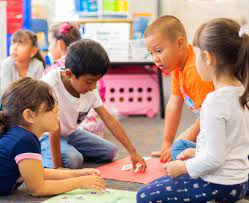

Education and culture are closely intertwined and play significant roles in Enculturation Analysis. Enculturation refers to the process through which individuals acquire and internalize the cultural values, beliefs, norms, and practices of their society or social group. It is how individuals learn and become members of a particular culture.
Education is one of the primary mechanisms through which enculturation occurs. It is the formal process of transmitting knowledge, skills, values, and attitudes from generation to generation. Education systems, whether formal or informal, are designed to socialize individuals into the cultural patterns and expectations of their society.
On the other hand, culture encompasses the shared beliefs, customs, behaviors, and artifacts that characterize a particular group of people. It includes language, religion, social norms, traditions, art, and literature. Culture provides the framework for education and shapes the educational system’s content, methods, and goals.
In summary, the analysis of education and culture are deeply interconnected. Education is crucial for enculturation, transmitting cultural knowledge and values to individuals. Culture provides the context and content for education, shaping the educational system and influencing its goals and outcomes. Together, education and culture contribute to the process of enculturation, enabling individuals to become active members of their society and pass on their cultural heritage to future generations.
Sex, Gender, and Sexuality Analysis: Enculturation Analysis


Sex education is closely related to gender equality as it is essential in promoting understanding, respect, and equal opportunities for individuals of all genders. Here are a few ways in which sex education contributes to gender equality:
- Knowledge and Awareness: Sex education provides individuals with accurate and comprehensive information about human sexuality, including reproductive health, sexual relationships, consent, contraception, and sexually transmitted infections. By equipping individuals with this knowledge, sex education helps challenge gender stereotypes, myths, and misconceptions surrounding sexuality and promotes a more accurate understanding of gender diversity.
- Empowerment and Agency: Sex education empowers individuals to make informed decisions about their bodies, relationships, and sexual health. This empowerment is crucial for achieving gender equality as it enables individuals, regardless of gender, to control their lives and make choices based on their needs and desires.
Overall, the analysis of sex education is an essential tool for achieving gender equality. Promoting knowledge, understanding, and empowerment challenges harmful gender norms, supports healthy relationships, and fosters a more inclusive and egalitarian society.
Race, Ethnicity, Religion, and Language Analysis: Enculturation Analysis


The comparison between language barriers and protesting the Black race in America is complex, as they are distinct issues with different contexts. However, it is possible to explore similarities regarding their challenges and the potential for addressing inequality. Here are a few points to consider:
- Marginalization and Discrimination: Both language barriers and racial discrimination can lead to marginalization and unequal treatment. Language barriers can limit access to education, employment, healthcare, and participation in social and political spheres. Similarly, racial discrimination against the Black race in America has historically resulted in systemic inequalities, including disparities in education, employment, criminal justice, and healthcare.
- The barrier to Opportunities: Language barriers can create obstacles to equal opportunities, as individuals who need to gain proficiency in the dominant language of a society may face limitations in accessing education, employment, and other resources. Similarly, racial discrimination can restrict opportunities and create barriers for the Black community, perpetuating socioeconomic disparities and hindering progress.
It is crucial to approach each issue with sensitivity to its unique historical, social, and cultural aspects. While language barriers and racial discrimination may share similarities, they should be understood and addressed in their respective contexts to ensure effective solutions and promote equality.
References for Enculturation Analysis:
- American Psychological Association (APA): The APA provides various resources on sex, gender, and sexual orientation, including publications, research articles, and guidelines. Their website is a valuable source for understanding the psychological perspectives on these topics. (Website: apa.org)
- “Enculturation” – Encyclopedia.com: [https://www.encyclopedia.com/social-sciences/encyclopedias-almanacs-transcripts-and-maps/enculturation]
- American Civil Liberties Union (ACLU). (2020). Sex Education and LGBTQ Youth: A Call to Action. This report explores the specific challenges faced by LGBTQ youth in accessing inclusive and comprehensive sex education, highlighting the importance of addressing these issues to promote gender equality and support marginalized communities.
- Centers for Disease Control and Prevention (CDC). (2020). Characteristics of an Effective Health Education Curriculum. This resource provides guidelines and recommendations for developing effective sex education programs, including strategies for addressing gender equality and promoting healthy relationships.





